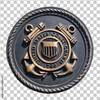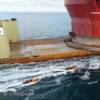The Interagency Task Force on USCG Roles and Missions has submitted a report to the President reaffirming the importance of the USCG's current mission portfolio and "emphatically and unanimously" supporting recapitalization of the Coast Guard's aging deepwater force capability. Of particular interest to AWO members, the report also affirms the value of government-industry partnership and highlights the AWO Responsible Carrier Program (RCP) as a model of such programs' success.
Established by Executive Order in March 1999, the task force was charged with providing "advice and recommendations regarding the appropriate roles and missions for the USCG through the year 2020." The task force was asked to give particular attention to the need to modernize the USCG's fleet of deepwater cutters, aircraft, and related capabilities. After a nine-month process including substantial public participation, the task force reached six conclusions:
Interagency Task Force's Conclusions
· The USCG's roles and missions support national policies and objectives that will endure into the 21st century;
· The U.S. will continue to need a flexible, adaptable, multi-mission, military USCG to meet national maritime interests and requirements well into the next century;
· In order to hedge against tomorrow's uncertainties, the USCG should be rebuilt so as to make it adaptable to future realities;
· In keeping with its well-deserved reputation as one of the federal government's most effective and efficient organizations, the USCG should continue to pursue new methods and technologies to enhance its ability to perform its vital missions;
· The recapitalization of the USCG's deepwater capability is a near-term national priority; and,
· The Deepwater acquisition project is a sound approach to that end and the Interagency Task Force strongly endorses its process and timeline.
The task force notes "The USCG's presence on the waterfront, as well as its ship design, inspection, and operational response capabilities, make it the cost-effective agency to execute the marine environmental protection mission." The task force also affirms "it is important to ensure state standards do not conflict with federal guidelines governing international and interstate vessel traffic."
The task force report also affirms the value of non-regulatory initiatives and government-industry partnerships as an important complement to a targeted USCG regulatory regime. The report cites the AWO RCP as an example of the benefits of such initiatives, noting, "These [the RCP's] standards exceed what is required by (and even maybe what is possible through) regulations. Compliance with the requirements of this program offers AWO members the benefits of consistently operating under a standard marine environmental protection framework ? a framework more stringent than Federal requirements."
Subscribe for
Maritime Reporter E-News
Maritime Reporter E-News is the maritime industry's largest circulation and most authoritative ENews Service, delivered to your Email five times per week












